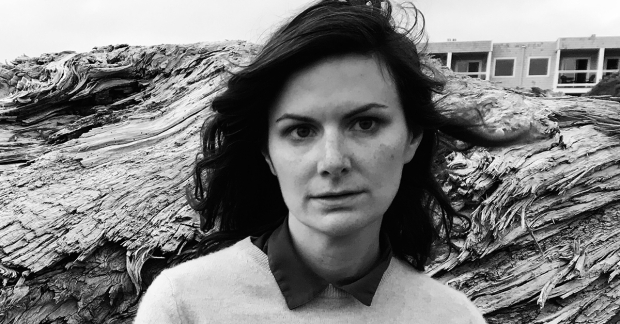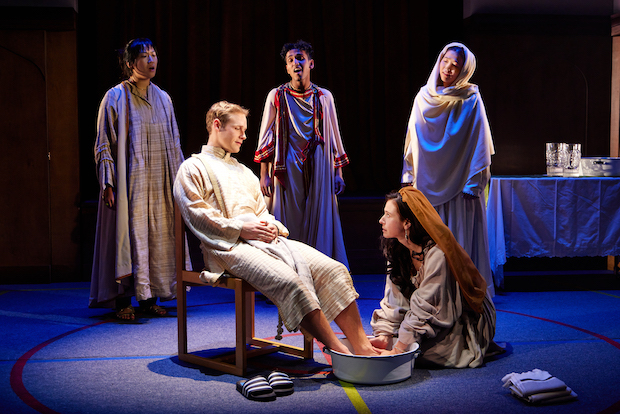Interview: Julia May Jonas on How Faith and Church Formed the Basis of Your Own Personal Exegesis
The playwright and novelist discusses her latest work, presented by LCT3.
What a year 2022 has been for writer Julia May Jonas. In February, Simon & Schuster published her widely acclaimed debut novel, Vladimir. Now, Lincoln Center Theater's LCT3 is presenting the world premiere of her play Your Own Personal Exegesis, running through December 31. Here, she tells us about this new work, which our critic called "a slow-boil confession that gently but insistently pulls you into the deep end."

(© Adam Sternbergh)
Your Own Personal Exegesis, to some, can be a scary title. How do you describe the play in your own words?
The play uses the loose form of a church service to recount the story of a youth pastor's fall from grace. The play is a memory play—both collectively and individually–and I wanted to use the form of a service to consider how we remember certain events and stories–in fits and bursts, images, imagined scenes, musically, with outsized emotional moments that loom perhaps larger than they were, expressionistic gestures, and gaps where we can't quite fill in the details.
Exegesis is a religious term for critical analysis (though it's often used in secular contexts now) and the play is exploring questions about the interpretation of past events, set against the stories of the Christian religion (which is also a building block of Western art) and how our foundational stories interact with the cultural foundational stories that many are raised with. I think I just made the play sound more scary, so I'll also describe it as a comedy with an emotional center, and beautiful music by Brian Cavanagh-Strong.
What made you write this play? How did you discover the story and characters?
My grandfather was a lapsed minister who renounced his faith, and I am, in turn, a church organist's daughter who grew up in the church—singing, playing my violin, participating in the pageants, sitting in the organ booth during services, doing my homework while my mother practiced. As my character Beatrice states, I was always there.
Being an employee of the church, especially one that is responsible for putting on the show, is a very different experience of church-going. There's a scepticism and humor that creeps in, and was aided by my grandfather's perspective, and the fact that my father is a non-believer. So the setting was always one I have wanted to explore. It felt like a release to allow myself to present and play with that world.
And when it came to the story, I am consistently drawn to presenting morally ambivalent women who are in conflict with themselves. Kat, the youth pastor is that woman for me: deeply flawed, interested in what she sees at goodness, and at the same time interested in corrupting that goodness. I wanted to write a sexual attraction that the audience could feel before anything was explicitly said or done. And I wanted to write about the potential dangers of believing our emotions, which I could talk about a lot! But that is very prevalent with all the teenagers in the play.

(© JeremyDaniel)
Do you see a line between the themes of your novel Vladimir and any of the situations within Exegesis?
Definitely. They are both about how longing, and the narratives that we create around longing, can distort our sense of reality. Reality is fairly difficult to grasp at any time in one's life, but certain situations can truly bring us away from ourselves and our internal compasses, and cause real harm.
How does your playwriting work inform your novelistic writing, and vice versa?
I think they make each other more what they are. I want my theater work to feel live, theatrical, dependent upon an audience. I'm Brechtian, I want the audience to always know they are watching a play with real people in front of them (the most incredible mental trick of theater, what we do with our disbelief from the moment we sit in a seat and agree that the people acting six-feet away from us are actually other people, is amazing to me always). I want to see virtuosity, to provide excellent roles for actors to dazzle folks with, to use music and dance and theatrical imagery, to think about duration, to do things that no other form can do, because they don't require the same presence to be performed. A novel is about colluding with someone's thoughts, and offers deep interiority, the possibility for insight, and intimacy—very different from writing for plays.
You started the year with the novel's publication; you're ending it with the production of the play. What has all been like for you to experience? How are you feeling right now?
It has been quite a year. I'm generally pretty dizzy and have a shock of gray hair where there wasn't before. Making the work is the best part for me, showing it and having it meet the public, the hardest. I'm fairly introverted and sensitive and prone to feeling overexposed, even when I know I should just be happy. That said, my goodness: I am so grateful—having a play produced in New York is akin to being struck by lightning, and the same with the reception and acknowledgment of Vladimir. I am so indebted and thankful to everyone who has believed in and supported and brought their artistry to my work in order to bring it to life. And now I'm looking forward to getting back to writing.









